
Teen orthodontics is a modern rite of passage. In 2020’s inaugural blog, guest poster Alice B reveals how she made it through and why she’s now thankful for sticking it out.
When you think of fixed braces (commonly known as train-tracks) you think of discomfort and inconvenience. There’s no denying it. But speaking from my own firsthand experience, when it’s all over, the good outweighs the bad.
I got my braces aged 14, and at that time my lower front teeth were an overlapping jumble due to overcrowding. I was told in no uncertain terms that the overcrowding was so bad, that when my wisdom teeth came through later in life, I would be in almost constant pain and would end up having to seek more painful and less effective treatment to rectify the situation.
I know what you’re thinking: Your mouth is designed to house teeth – surely nature wouldn’t get it that wrong? Well, if in doubt, consider the appendix, or think about eating soft food and suddenly biting into the side of your mouth so hard you draw blood. Nature is an idiot sometimes.
I had four large back teeth removed to begin the process, one from each side, both bottom and top. After this, I had the brackets fixed on, the wires threaded through and the tightening began. Yes there was pain, as there was every four to six weeks when I went back to get the wires tightened. It wasn’t severe though, your standard high street painkiller sorted it out. Yes there was also discomfort, sometimes a bracket would rub on the inside of my lip and cause an ulcer, but I was provided with a wax to cover the rogue bracket and make it smoother and less abrasive.
Really, for a teenager, the biggest issue was the look of the things. A smile glinting with metal seems a daunting prospect, until you realise that somewhere around 200,000 people get fixed braces each year in England and Wales. My glinting metal smile was not the only such smile in the school cafeteria at lunchtime. I also learnt to own it, not to be shy about my smile. The more at ease with the braces I became, the less other people noticed or cared about them. This is truly a valuable lesson in self confidence for any teenager.
I had my braces for nearly two years. They became a part of me, I got used to how they felt, I got to know my orthodontist very well. Until, suddenly, it was time for them to come off. I’ll never forget the feeling of running my tongue over my teeth that first day. My teeth felt smaller, too flat, too smooth. I kept smiling into the mirror.
For a year or so after the braces were removed I had to wear a retainer at night, and I had metal bands (like a bracelet for your tooth) fitted around two of my lower back teeth, one on either side, which secured a thin metal bar behind my lower front teeth to keep them in place. Yes I still had metal in my mouth, but I didn’t care. Nobody could see it, and there were no more ulcers, no more tightenings.
Now as an adult, with all four of my wisdom teeth through with none of the pain that a lot of people feel, I am so thankful for my braces. The wisdom teeth have pushed my other teeth around, bullied them into becoming a little overcrowded again, but that just goes to show how vital my braces were. If they are overcrowded now, just imagine the pain and horror had I not dealt with it. I also thank my dentist and my parents for having the foresight to get it sorted at a young age, so that I could have them done and dusted by 16, and end up metal-free for university.
You’ve Waited Long Enough
Get in touch with us to learn about award-winning, specialist-led cosmetic, restorative and general services at Reading’s home of slow dentistry.
Get in touch
![📣 Read our Spring newsletter to find out all about what's been going on at Woodborough House recently! 👇
We've had lots to smile about! 😄
Go to: https://mailchi.mp/e7e247861bdb/spring-2024?e=[UNIQID]
If you'd like to receive our newsletters and you haven't already subscribed, please email us at info@woodboroughhouse.com and we'll add you to our mailing list.](https://www.woodboroughhouse.com/wp-content/plugins/instagram-feed/img/placeholder.png)